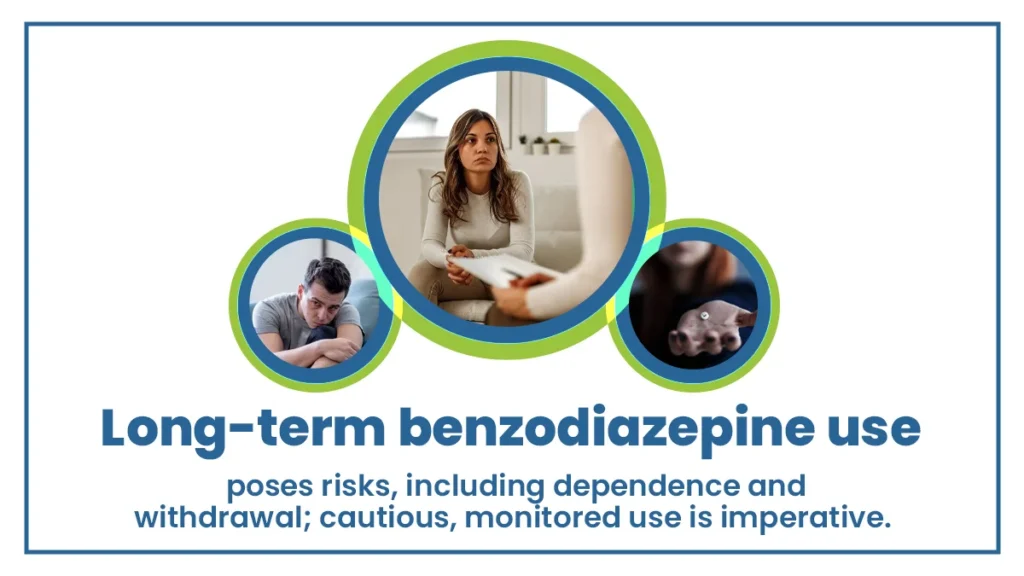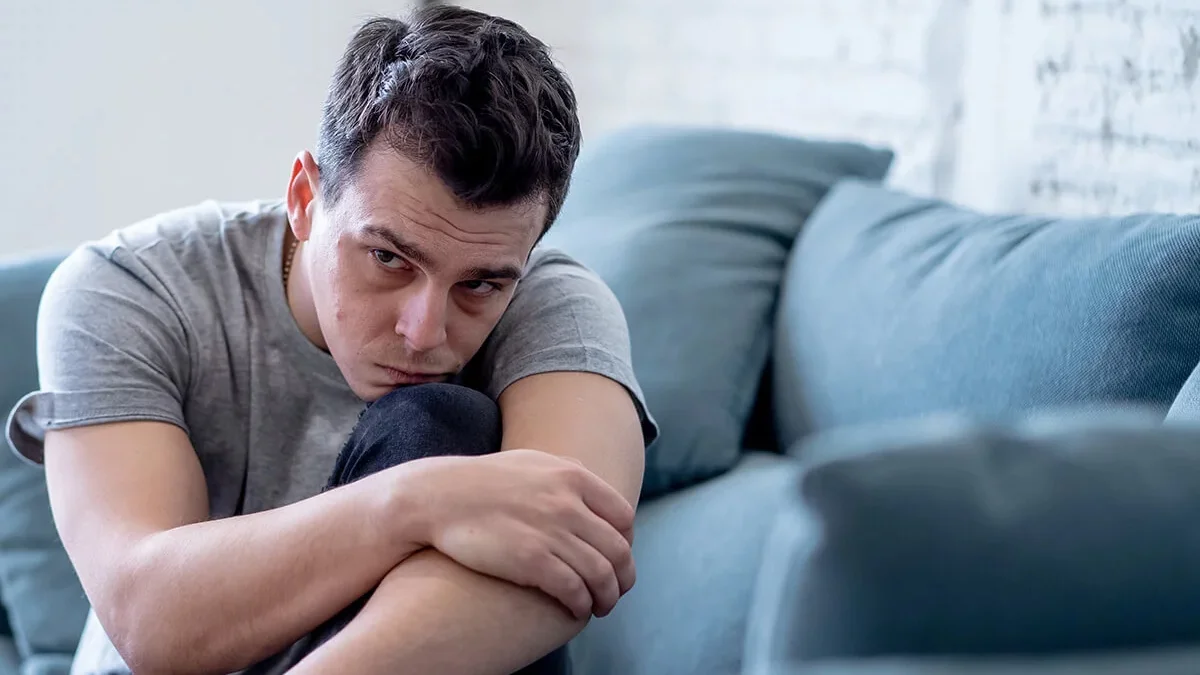Side Effects of Benzodiazepines
Benzodiazepines are medications commonly prescribed to alleviate anxiety and insomnia. It acts on the central nervous system for a calming effect. During alcohol detox, doctors prescribe this drug to manage withdrawal symptoms for smooth recovery.
However, the use of benzodiazepines can bring about side effects. These may include increased drowsiness, fatigue, and poor coordination. Such side effects can pose risks to daily life. It is essential for individuals undergoing alcoholism treatment to be mindful of these potential side effects to ensure a safer and more effective recovery journey.

Key Takeaways
Benzodiazepines treat anxiety, but caution is vital, especially during alcohol detox, to prevent side effects. Here’s what you need to know:
- Short-term use of benzodiazepines is recommended for effective and safe results.
- Side effects like drowsiness and dizziness are common; careful use is crucial during alcohol withdrawal.
- Long-term benzodiazepine use poses risks, including dependence and withdrawal; cautious, monitored use is imperative.
- Recovery facilities can help you come up with the best plan for treatment.
The Haven Detox-Little Rock is here to help you achieve sobriety. Call us at (501) 271-3342 today.
Use of Benzodiazepines
Benzodiazepines, often referred to as “benzos,” are a class of medications renowned for their significance in treating various mental health conditions, primarily anxiety and sleep disorders. Widely recognized for their tranquilizing effects, benzodiazepines play a pivotal role in providing relief to individuals grappling with heightened nervousness, seizures, and mania.
How Benzodiazepines Work
Benzodiazepines enhance the activity of a neurotransmitter in the brain known as gamma-aminobutyric acid (GABA). GABA is a natural calming agent, inhibiting excessive brain activity that leads to stress. Benzodiazepines boost GABA’s effects and promote relaxation.
This drug alleviates symptoms associated with anxiety and sleep disturbances. These medications come in various forms, such as diazepam and lorazepam, and medical experts advise them to be used for a short time due to their potential for dependence.
While their effectiveness in managing mental health conditions is well-specified, it is crucial to comprehend the mechanism behind their action to value their therapeutic benefits. Despite their efficacy, cautious and monitored use is paramount to mitigate the risk of dependence and side effects.
Common Side Effects of Benzodiazepines
Benzodiazepines are a class C drug that doctors often give to help with anxiety and when someone is trying to quit drinking alcohol. These drugs can cause different problems, and it’s essential for both physicians and people taking them to know about these issues.
Physical Side Effects
In some patients, benzodiazepines may lead to slowed breathing, known as respiratory depression, particularly when used in high doses or for a prolonged period.
Physical coordination can be adversely affected, causing:
- Dizziness
- Impaired motor skills
- Lack of understanding of surroundings
While benzodiazepines are often employed to manage symptoms of alcohol withdrawal, their use can present physical side effects such as increased drowsiness. Other common side effects encompass sedation, slurred speech, tremors, and blurred vision. Memory impairment and confusion further highlight the importance of taking preventive measures and monitoring benzodiazepine use to lessen these potential consequences.
Psychological Side Effects
Paradoxically, in some individuals, benzodiazepines may lead to psychological dependence and exacerbate symptoms of anxiety disorders, including:
- Excessive worry
- Heightened sensitivity
- Restlessness
Certain patients may experience heightened vulnerability to panic attacks, potentially intensifying the psychological impact of benzodiazepine use.
Understanding these physical and psychological side effects is crucial for both patients and healthcare providers to make informed decisions regarding the use of benzodiazepines in the management of anxiety and related conditions.
Serious Side Effects of Benzodiazepines
Benzodiazepines, while effective for managing certain conditions, carry the potential for serious side effects that warrant careful consideration, particularly with prolonged use.
Long-Term Effects on Physical Health
Long-term use of benzodiazepines can have enduring effects on physical health. Chronic consumption may lead to increased tolerance, requiring higher doses for the same effect. This escalation heightens the risk of adverse effects, such as respiratory depression and impaired coordination.
Furthermore, long-term use is associated with concerns such as:
- Muscle weakness
- Fatigue
- Digestive issues like vomiting and nausea
These physical manifestations underscore the importance of closely monitoring individuals on extended benzodiazepine pills, emphasizing a balance between therapeutic benefits and potential drawbacks.
Potential for Dependency and Withdrawal
One of the most critical concerns in benzodiazepine use is the potential for dependency and withdrawal. Due to their calming effects on the central nervous system, individuals may develop a tolerance, leading to dependence.
Abrupt cessation or attempts to reduce dosage may trigger withdrawal symptoms, ranging from rebound anxiety to seizures. A person is likely to expect intense cravings that can impact their focus on performing daily tasks.
Doctors and nurses must ensure people get the right help from medications. They use techniques like the tapering method to help patients stop the use of this drug without experiencing intense withdrawal effects. They examine the patient to find the right balance so they feel better without getting too used to the medicine.
Coping with Side Effects of Benzodiazepines
Benzodiazepines, like many medicines, can sometimes bring about side effects. Knowing how to handle them is important for a safe and effective treatment journey. Here are the coping techniques to reduce its side effects:
Managing Mild Side Effects
If you notice mild side effects while using benzodiazepines, there are things you can do to make it more manageable. Minor changes to manage the side effects of this sedative drug, including taking the medicine with food or adjusting the time you take it, might help.
Talking to your healthcare professional about these unwanted effects is crucial. They might suggest changes in your dosage or even recommend other treatment options.
It’s also important to be aware of the risk of developing substance use disorder, especially when combining benzodiazepines with alcohol. That could be dangerous. Seeking medical advice before changing your treatment plan is a smart move.
Take Action for Serious Side Effects
If you notice any sudden changes in your health or behavior, seeking immediate medical attention is a must. Remember, never stop benzodiazepine treatment abruptly without consulting your healthcare professional. They can guide you through a safe drug and alcohol detox process.
Some medicines, like certain antidepressants, might interact with benzodiazepines, which may worsen mental health disorders. For those on benzodiazepines and other medications, communicating openly about your medical condition is vital.
Benzodiazepine Use in Special Populations
Benzodiazepine use requires careful consideration, especially in special populations like older adults, pregnant or nursing women, and children, as their unique needs and vulnerabilities must be addressed.
Older Adults
Prescribing benzodiazepines to older adults requires caution due to age-related changes in drug metabolism. Sensitivity to these medications may increase, leading to a higher risk of adverse effects like drowsiness and poor coordination.
Additionally, benzodiazepines have been linked to an increased risk of falls. That makes benzos use in older populations a delicate balance between managing symptoms and avoiding potential harm. Under the guidance of healthcare experts, regular monitoring and adjustments are crucial to ensuring safe and effective treatment for older individuals.
Pregnant or Nursing Women
The use of benzodiazepines while pregnant or nursing requires careful evaluation. These medications can potentially cross the placenta or transfer to breast milk, affecting the developing fetus or newborn.
Certain benzodiazepines might be seen as somewhat safer for pregnant women, while others could bring risks. Doctors must carefully consider the benefits the medicine can do versus any possible problems.
They also examine other options and talk extensively with pregnant or nursing women. They want everyone to decide together what’s best for the health of both the mom and the baby.
Children
In children, the use of benzodiazepines is relatively uncommon and reserved for specific medical conditions under close medical supervision. Due to differences in how children metabolize medications, careful dosing and monitoring are essential to prevent unwanted effects.
The potential impact on cognitive and psychomotor development also underscores the need for medical attention. Healthcare professionals work closely with parents and caregivers to explore alternative treatments and closely observe any use of benzodiazepines in children, ensuring the utmost care in their therapeutic management.
Exploring Alternatives to Benzodiazepines
Benzodiazepines are one way to help with stress and sleep, but other choices might be better for some people. Let’s look at different options to find what works best.
Medication Alternatives
Some medicines used to lift mood and manage stress can be alternatives. They work differently but can still help with anxiety. Buspirone is another medicine that is different from benzodiazepine but helps with anxiety. It’s often used for longer periods without the same risk of dependence.
For sleep, melatonin is a natural option. It helps regulate sleep patterns without the same concerns as benzodiazepines. Certain allergy medicines can also calm people and aid sleep without the same risks.
Non-Medication Alternatives
Talking to someone, like a therapist, can be helpful. They teach different ways to manage stress and improve sleep. Moreover, exercising like jogging and stretching can make a big difference.
Even a short walk can help reduce stress and improve sleep. Learning deep breathing or meditation can calm the mind and promote better sleep.
Considering these alternatives with the guidance of a medical professional allows individuals to explore options that suit their needs while minimizing potential risks associated with benzodiazepine use. It’s about finding the right fit for a healthier and more balanced well-being.
Frequently Asked Questions (FAQ)
What is a major drawback when using benzodiazepines?
A major drawback of benzodiazepines is their potential for dependence and addiction. Prolonged use can lead to tolerance, where higher doses are needed for the same effect, increasing the risk of addiction and withdrawal symptoms upon discontinuation.
What are the most common side effects of benzodiazepines on the central nervous system?
The most common side effects of benzodiazepines on the central nervous system include drowsiness, dizziness, and impaired coordination. These effects can impact daily functioning and increase the risk of accidents, especially when combined with other central nervous system depressants like alcohol.
What are the side effects of long-term benzodiazepine use?
Long-term benzodiazepine use may result in cognitive impairment, memory issues, and a heightened risk of falls. Additionally, individuals may experience emotional blunting, where emotions become less intense or apparent, impacting overall emotional well-being. These side effects highlight the need for careful consideration and monitoring during extended benzodiazepine treatment.
Begin Your Healing at The Haven Detox-Little Rock
Benzodiazepine is helpful during alcohol treatment and anxiety disorders. The Haven Detox-Little Rock offers effective benzodiazepine addiction treatment, guiding you toward lasting wellness. Experience a tailored detox process designed to prioritize your comfort and safety. Our residential treatment provides a supportive environment where healing takes center stage.
Reach out now for a path to recovery that prioritizes your well-being. Talk to our professional team at (501) 271-3342 today.





